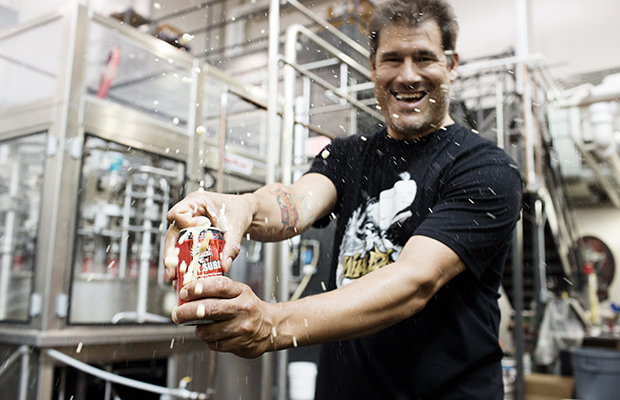
Mere minutes after sitting down to talk for this cover story piece, Surly founder Omar Ansari was masked-up and on the packaging line along with Bill Manley, the Vice President of Marketing. Everyone is doing their part now to get beer out the door amid the COVID-19 pandemic.
Down 280 employees since March, including nearly 200 in the service side of the Minneapolis brewery’s massive beer hall that was constructed in 2015, all Surly employees have been taking on additional tasks outside of their normal workday.
“The only cold comfort is knowing that everyone else was in the same boat,” Ansari said of the craft beer industry during this spring. “Danny (Dinovis, the brewery’s VP of Hospitality Operations) and his team worked with those people every day and hung out with them and partied with them and took vacations together. It just … it sucks.
“Hopefully we’ll kind of keep bringing them back here as this place opens up, and we’ll just sort of see what happens.”
‘Seeing what happens’ has sort of been the mantra since the start for the brewery that began very late in 2005 and grew to become the 34th largest brewery in America by the end of 2019.
“It’s a lost year,” he admitted. “I don’t know how much money we’re gonna make, because a lot of staff are gone. This (gesturing to the beer hall) is not designed to work as the model, but we’re doing it because it’s what we got. So I guess we’re in the same boat as a lot of companies that are greatly impacted by COVID. It’s sort of like, we’ll make it, we’ll figure it out. Hopefully, 2021 will be kind of more normal, maybe not, but whatever.”
In early June, the brewery was able to reopen its beer hall, but packaging is still key, with about 65 percent of its more than 90,000 barrels per year going out via cans normally, more since the pandemic hit.
Growing to the size they are is a lofty goal now for many breweries that have come online in the last 10 years. The new normal isn’t hitting 100,000 barrels anymore, although Ansari said that preparation for that sort of growth is possible if done right.
“It seems to me — from the outside and I don’t know these companies — but Rhinegeist or Modern Times, they really seem like they have their shit together. Right? They’re starting with teams that know what they’re doing.”
About three years ago, Ansari said shoring up the management team side of the business really began in earnest by figuring out flow and a reporting structure.
“[I felt] the beer side is pretty good. The marketing side, they’ve got a good dial in on what they’re trying to do. Just the internal piece was not working great,” he said.
“So that has been one of the big pieces to work on. We now have managers in positions in which they’re good at managing. Not just because they’ve been around the company. It’s made better for me and for employees also because they’re getting managed right.”
Managing is not easy to learn so having people with experience it’s been, I think, a real plus for the company.”
Ansari likes looking at the big picture and doing the actual work, “the in-between part is not what I’m great at — managing other people. And so that’s been the big change.
“Over the years, I don’t have to focus on the stuff that I don’t like doing. I’m not good at it.”
That means Manley coming over from Sierra Nevada, Will Crosby came from Firestone Walker to now become the VP of Brewing Operations at Surly while Bob Repp is VP of Sales at Surly after working at Green Flash as a regional sales manager along with working on the wholesale side.
“Mary Sellke, one of our longtime employees, said at Surly we usually just push you over the boat. If you need a life jacket, maybe we’ll throw you one, but it’s kind of a swim or sink and that’s not always the fairest way to do it,” Ansari said of the previous way people moved up the management ladder. “Having people now that have done it, it’s helped out a lot.
“Me mistakenly promoting people because they’ve been there a long time, and that doesn’t always work out the best, unfortunately.”
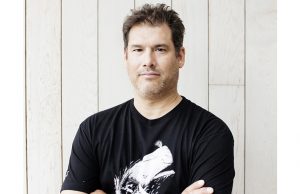
Unlike some of the newer breweries that have grown fast and had those teams in place that Surly now has, Ansari laughs when he discusses the business plans for the brewery early on. Growth like even what the brewery is now was never in the cards.
“It just wasn’t even an option. Breweries just weren’t that big,” he said when he thought back to 2004, where he had a lightbulb moment in seeing a three-barrel brewing system for sale in a More Beer catalog and started to figure out the plans for Surly in the back of his parents’ abrasives factory with Todd Haug.
“When we opened, you know, Summit and Bells were like 30-40,000 barrels, and back then they were considered huge. So it wasn’t any plan. It just didn’t seem reasonable.”
A trip to Stone in 2008 showed Ansari that craft beer was gaining traction and growth could happen.
“As time went on, we realized that we can bring something different to Minnesota,” he said. “I kind of knew we had a window to build the brewery because it was gonna saturate and I knew that at some point, you probably weren’t going to be able to get a bank loan to do something. It seemed like we had to make the move when we did, otherwise, we probably wouldn’t be able to do it later.”
Yet Minnesota’s prohibition laws were a challenge. Production brewing was the one way Surly could function and laws needed to be changed, especially letting breweries sell pints to consumers in a tasting room.
So Surly took the lead on getting laws changed Ansari said it had been brought up before, so much that when he went to the local newspaper to get some coverage on the story he was shot down because they felt it would never happen.
“We were able to make it a little bit bigger deal,” Ansari said, teaming with a bi-partisan team of legislators in Republican Rep. Jenifer Loon and Democrat Senator Linda Scheid after hiring a lobbyist — Clint Roberts of One Simple Plan — to get the wheels turning, framing it as an economic issue instead of just a beer issue.
“I told them I can do this in Hudson, Wisconsin, just 30 minutes from here,” Ansari explained. “Why would I spend $30 million there? I’m a Vikings fan, not a Packers fan. I grew up here, why would I not want this here?”
The shift happened after those opposing it stated that if they want to go to Wisconsin to build it, then go ahead. That didn’t sit well with those that saw Surly, and other breweries in Minnesota, being able to make more money for their communities.
“You can’t say stuff like that. You can’t expect the representative to carry your water when you’re like, ‘I don’t care about jobs.’” Ansari recalled. “We kind of got some momentum with social media. I mean, that was really how we did it. Someone came up to me and said, it’s the biggest issue with the capitol outside of the Vikings stadium. So I’m like, holy crap, it’s that big of a deal.
“Everyone loves beer, you know. Legislators kind of have their own position but there comes a point where they’re like, ‘Oh, my God! Look at all these people that care about this.‘ And then that was kind of the difference, and we were able to push it through now.”
That was 2011, just five years after opening. By the time the beer hall was opened, the brewery was planning its 10th-anniversary party, a far cry from just wanting to give the consumers of Minnesota something similar to the West Coast when it came to beer options.
“The Twin Cities really just had Summit. And we would go skiing out in Colorado or Montana, Idaho, Seattle … and I was like Jesus Christ! Look at all the beer out here. It’s crazy,” he said. “As a homebrewer, I just brewed IPAs. It just seemed like an easy opening to fill.”
But Surly sold less beer in 2019 than 2018, which was the first valley in the brewery’s growth.
“At some point growth for growth’s sake doesn’t get you where you need to be,” Ansari said. “We’re not going to grow just to open up a new state. And I don’t think us growing into other markets is gonna happen. It’s fun. And it’s great to be in other spots. But I doubt we’re going to sell a lot of beer in Seattle, and not sure why anyone would feel the need to go and drink our beer all the time there. Right?
“Selling beer is hard. And we’re in the markets we’re in. It’s kind of the same way I have done it from Day One. I’ve always sort of tried to react to what the market is and for us to jam enough beer out to become a 200,000-bbl brewery? I mean, I don’t know if that would be for us.
“Now who knows, with COVID, we may have hit peak Surly. I think there’s got to become a spot that makes sense for us.”

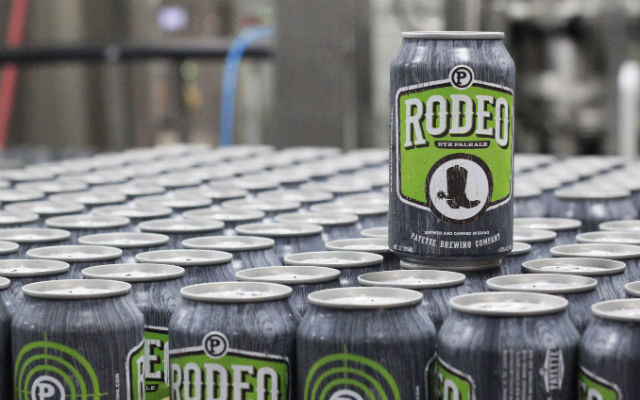
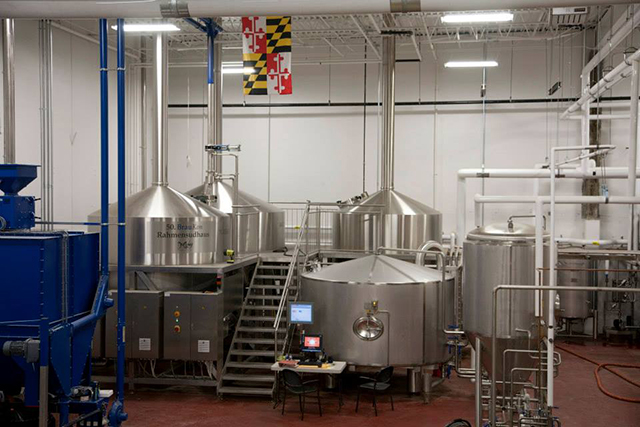
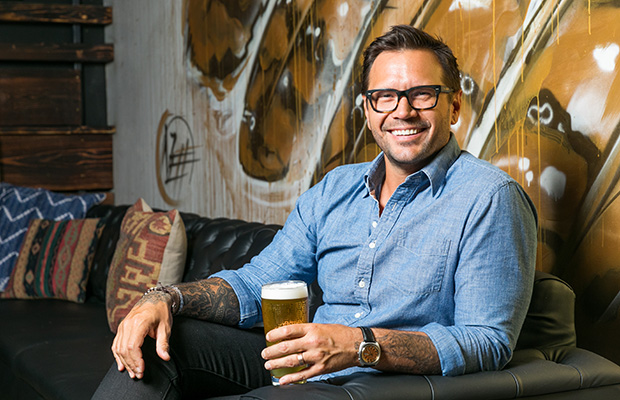
Be the first to comment